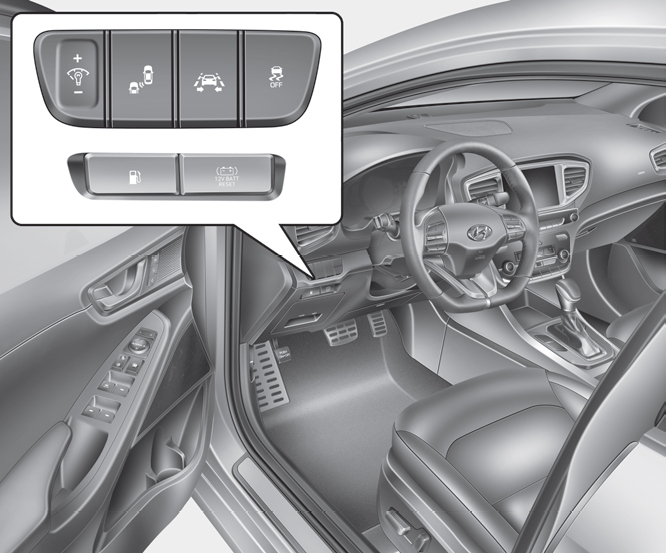Hyundai Ioniq: Air bag - Advanced supplemental restraint system / What to Expect After an Air Bag Inflates
After a frontal or side air bag inflates, it will deflate very quickly. Air bag inflation will not prevent the driver from seeing out of the windshield or being able to steer. Curtain air bags may remain partially inflated for some time after they deploy.
WARNING
After an air bag inflates, take the following precautions:
- Open your windows and doors as soon as possible after impact to reduce prolonged exposure to the smoke and powder released by the inflating air bag.
- Do not touch the air bag storage area's internal components immediately after an air bag has inflated. The parts that come into contact with an inflating air bag may be very hot.
- Always wash exposed skin areas thoroughly with cold and mild soap.
- Always have an authorized HYUNDAI dealer replace the air bag immediately after deployment. Air bags are designed to be used only once.
Noise and smoke from inflating air bag
When the air bags inflate, they make a loud noise and may produce smoke and powder in the air inside of the vehicle. This is normal and is a result of the ignition of the air bag inflator. After the air bag inflates, you may feel substantial discomfort in breathing because of the contact of your chest with both the seat belt and the air bag, as well as from breathing the smoke and powder. The powder may aggravate asthma for some people. If you experience breathing problems after an air bag deployment, seek medical attention immediately. Though the smoke and powder are nontoxic, they may cause irritation to the skin, eyes, nose, throat, etc. If this is the case, wash and rinse with cold water immediately and seek medical attention if the symptoms persist.
 How Does the Air Bag System Operate?
How Does the Air Bag System Operate?
The SRS consists of the following components:
1. Driver's front air bag module/ Driver's knee airbag module
2. Passenger's front air bag module
3. Side air bag modules/ Side impact sensors
4...
 Occupant Classification System (OCS)
Occupant Classification System (OCS)
Your vehicle is equipped with an Occupant Classification System (OCS) in the
front passenger's seat.
Main components of the Occupant Classification System
A detection device located within the front passenger seat cushion...
Other information:
Hyundai Ioniq (AE) 2017-2025 Service Manual: Power Door Lock Module. Repair procedures
Inspection • Wrap the protective tape on the tool to disassemble with the screwdriver or remover. • Use caution in keeping and handling during disassembling/assembling because it is easily contaminated with lubricant and oil...
Hyundai Ioniq (AE) 2017-2025 Service Manual: Fuel Pump Control Module (FPCM). Schematic diagrams
C..
Categories
- Manuals Home
- 1st Generation Ioniq Owners Manual
- 1st Generation Ioniq Service Manual
- Smart Cruise Control System
- Reverse Parking Aid Function
- Check brakes/Check regenerative brakes, Check Virtual Engine Sound System
- New on site
- Most important about car
Hybrid Vehicle Interior Overview

1. Door lock/unlock button
2. Driver position memory system
3. Side view mirror control switch
4. Central door lock switch
